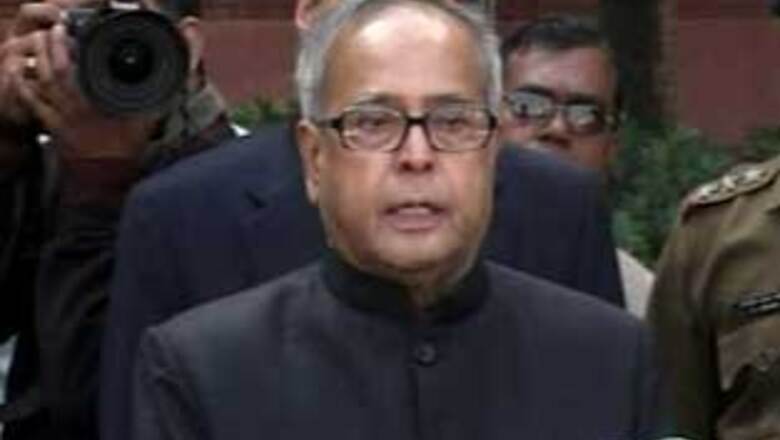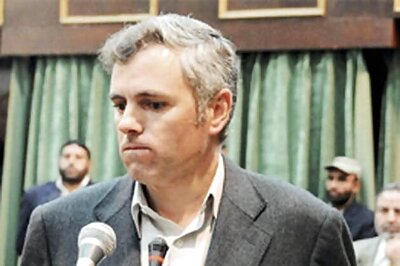
views
New Delhi: With Nepal headed for a crisis following the resignation of Prime MInister Prachanda, a concerned India on Monday walked a diplomatic tightrope, saying it was "an internal affair" of the Himalayan republic and advocated "broadest possible political consensus" that will enable Nepal to focus on democratic transition.
"What is happening in Nepal is internal to Nepal," External Affairs Minister Pranab Mukherjee said.
He was reacting to the crisis sparked off by the sacking of Army Chief General Rookmangud Katawal on Sunday - a divisive issue that led to the resignation of Nepal's Maoist Prime Minister Pushpa Kamal Dahal, better known as Prachanda, on Monday afternoon.
"We wish Nepal well in its transition to a fully democratic polity and would hope that the present crisis is resolved in a manner which contributes to the early conclusion of the peace process," Mukherjee said.
"We would hope that the broadest possible political consensus would make it possible for Nepal to concentrate on the agreed task of constitution-making and of democratic transition," he added.
In his resignation speech, Prachanda blamed the political parties, which included the opposition as well as his own allies, as well as "foreign powers" for the lack of progress made by his eight-month government.
Without naming India, he also accused it of interfering in Nepal's internal matters and said the country would never bow down before foreign masters.
Nepal's Finance Minister Baburam Bhattarai was, however, more vocal in accusing India of trying to wreck the Maoist government.
"India supported the army and the president in their unconstitutional acts against democratic forces," Bhattarai told IANS in Kathmandu. "It was an enormous blunder."
The accusations about India's interference did not, however, merit any official comment from New Delhi.
Sources close to the government pointed out that such posturing was meant for public consumption in Nepal but did not contain a grain of truth as India is solely concerned with peace, stability and the continuation of the democratic transition in that country.
India is closely watching developments and is hoping that there is no repeat of 2006 street protests and violence that accompanied the democratic revolution as any political instability will have spillover effects.
New Delhi's primary concern is to see that the three-year-old peace process is not derailed from achieving the twin tasks of the framing of the constitution and development, the sources said.
"We don't meddle in others' affairs. But we, like other well-meaning friends of Nepal, have been advocating that it was necessary to keep political consensus intact," a source said.
"It's a difficult, sensitive situation. The need of the hour is for Nepal to take decisions by bipartisan consensus."
"It does not matter who is in government. Our relations with Nepal are unique and that's not going to change," the source said, when asked about the possibility of Nepali Congress leader Girija Prasad Koirala forming the next government with the support of other parties.
India feels that the process of "multi-layered consensus" which has been stipulated by the interim constitution in Nepal should be followed to resolve the crisis.
"Efforts are on to persuade important players not to endanger political stability. But it's ultimately for them to decide," the sources said.
Experts and Nepal-watchers are worried about implications of the crisis in the Himalayan nation for India.
"It's a national crisis. Political instability in the neighbouring country affects us, specially when the two countries have such strong people-to-people relationship," Brajesh Mishra, a former national security adviser and a close aide of former prime minister Atal Bihari Vajpayee, told IANS.
The sacking of Nepal's army chief has been seen in some quarters as a snub to India which had been trying to persuade Prachanda to defer the decision till the army chief's term expired in August.
Mishra, however, thinks that conspiracy theories about the India pressure are widely off the mark. "To put the blame on India is not appropriate. The crisis has been created by the Maoists who were keen to integrate People's Liberation Army into the Royal Nepal Army."
"Obviously, other parties did not go along with it. And even the Nepal Army was not ready for such a move," he added.
Major Gen. (retd.) Ashok Mehta, a Nepal expert, is banking on "a compromise face-saving formula" that can avert a larger political crisis that could include even a civil-war like situation.
"If the peace process gets derailed, all options open up: the Maoists going back to the jungle and the army plotting a coup. If there is no compromise solution and this government collapses, there will be complete chaos and a civil war," Mehta said.
"India should put a lot of diplomatic pressure, along with other countries, on the powers-that-be in Nepal to see that the country does not get back to political instability," he said.



















Comments
0 comment